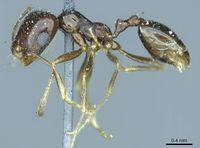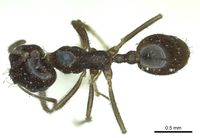Monomorium barbatulum
| Monomorium barbatulum | |
|---|---|

| |
| Scientific classification | |
| Kingdom: | Animalia |
| Phylum: | Arthropoda |
| Class: | Insecta |
| Order: | Hymenoptera |
| Family: | Formicidae |
| Subfamily: | Myrmicinae |
| Tribe: | Solenopsidini |
| Genus: | Monomorium |
| Species group: | salomonis |
| Species: | M. barbatulum |
| Binomial name | |
| Monomorium barbatulum Mayr, 1877 | |
Identification
Distribution
Latitudinal Distribution Pattern
Latitudinal Range: 43.283333° to 22°.
| North Temperate |
North Subtropical |
Tropical | South Subtropical |
South Temperate |
- Source: AntMaps
Distribution based on Regional Taxon Lists
Afrotropical Region: United Arab Emirates.
Palaearctic Region: Afghanistan, Iran, Israel, Kazakhstan (type locality), Kyrgyzstan, Oman, Türkiye, Turkmenistan.
Distribution based on AntMaps
Distribution based on AntWeb specimens
Check data from AntWeb
Countries Occupied
| Number of countries occupied by this species based on AntWiki Regional Taxon Lists. In general, fewer countries occupied indicates a narrower range, while more countries indicates a more widespread species. |

|
Estimated Abundance
| Relative abundance based on number of AntMaps records per species (this species within the purple bar). Fewer records (to the left) indicates a less abundant/encountered species while more records (to the right) indicates more abundant/encountered species. |

|
Biology
Castes
Nomenclature
The following information is derived from Barry Bolton's Online Catalogue of the Ants of the World.
- barbatulum. Monomorium barbatulum Mayr, 1877: 17 (w.) KAZAKHSTAN or UZBEKISTAN.
- Type-material: syntype workers (number not stated).
- Type-locality: Kazakhstan or Uzbekistan: “Habitat in desertis Kisil-kum” (A. Fedtschenko).
- Type-depository: NHMW.
- [Also described as new by Mayr, 1880: 36.]
- [Misspelled as bartatulum by Collingwood, 1961a: 62.]
- Emery, 1889a: 441 (q.m.).
- Combination in M. (Xeromyrmex): Emery, 1922e: 176.
- Status as species: Mayr, 1880: 36; André, 1883a: 332 (in key); André, 1884b: 541; Emery, 1889a: 441; Nasonov, 1889: 29; Dalla Torre, 1893: 65; Ruzsky, 1905b: 636; Emery, 1908h: 671; Karavaiev, 1910b: 58; Emery, 1922e: 176; Ruzsky, 1923: 4; Kuznetsov-Ugamsky, 1926a: 74 (in key); Santschi, 1936a: 35; Collingwood, 1961a: 62; Ettershank, 1966: 87; Pisarski, 1967: 396; Pisarski, 1970: 309; Tarbinsky, 1976: 79 (redescription); Arnol'di & Dlussky, 1978: 538 (in key); Dlussky, 1981a: 17; Collingwood, 1985: 269; Kugler, J. 1988: 257; Dlussky, Soyunov & Zabelin, 1990: 233; Bolton, 1995b: 259; Schultz, R. et al. 2006: 206; Vonshak, et al. 2009: 43; Paknia, et al. 2010: 33; Collingwood, et al. 2011: 432; Borowiec, L. 2014: 116; Kiran & Karaman, 2020: 308.
- Distribution: Afghanistan, Iran, Israel, Kazakhstan, Kyrgyzstan, Oman, Russia, Turkey, Turkmenistan, United Arab Emirates, Uzbekistan.
Taxonomic Notes
Sharaf et al. (2021): Monomorium barbatulum looks similar to some members of the genus Trichomyrmex in terms of the following characters: polymorphic with 12-segmented antennae that lacking the well-defined terminal club; masticatory margin of mandibles armed with 3–4 teeth; propodeum unarmed. However, M. barbatulum lacks a critical diagnostic character for the genus Trichomyrmex which is the absence of the transverse striations on propodeal dorsum. With the availability of more material for a comprehensive taxonomic investigation, together with additional molecular evidence(s), we will be able to resolve properly the taxonomic status of the species.
Description
References
- Borowiec, L. 2014. Catalogue of ants of Europe, the Mediterranean Basin and adjacent regions (Hymenoptera: Formicidae). Genus (Wroclaw) 25(1-2): 1-340.
- Collingwood, C.A., Agosti, D., Sharaf, M.R., van Harten, A. 2011. Order Hymenoptera, family Formicidae. Arthropod fauna of the UAE 4: 405-474.
- Dubovikoff, D.A., Yusupov, Z.M. 2017. Family Formicidae - Ants. In Belokobylskij S. A. and A. S. Lelej: Annotated catalogue of the Hymenoptera of Russia. Proceedingss of the Zoological Institute of the Russian Academy of Sciences 6: 197-210.
- Emery, C. 1889b. Intorno ad alcune formiche della fauna paleartica. Ann. Mus. Civ. Stor. Nat. 27[=(2)(7): 439-443 (page 441, queen, male described)
- Emery, C. 1922c. Hymenoptera. Fam. Formicidae. Subfam. Myrmicinae. [part]. Genera Insectorum 174B: 95-206 (page 176, Combination in M. (Xeromyrmex))
- Kiran, K., Karaman, C. 2020. Additions to the ant fauna of Turkey (Hymenoptera, Formicidae). Zoosystema 42(18), 285-329 (doi:10.5252/zoosystema2020v42a18).
- Mayr, G. 1877a. Formicidae. In: Fedchenko, A. P. Travels in Turkestan. Vol. 2, Div. 5, No. 7. Izv. Imp. Obshch. Lyubit. Estestvozn. Antropol. Etnogr. Imp. Mosk. Univ. 26:i-iii, 1-20 (+1). (page 17, worker described)
- Mayr, G. 1880. Die Ameisen Turkestan's, gesammelt von A. Fedtschenko. Tijdschr. Entomol. 23: 17-40 (page 36, Redescribed in Latin)
- Sharaf, M.R., Mohamed, A.A., Boudinot, B.E., Wetterer, J.K., Hita Garcia, F., Al Dhafer, H.M., Aldawood, A.S. 2021. Monomorium (Hymenoptera: Formicidae) of the Arabian Peninsula with description of two new species, M. heggyi sp. n. and M. khalidi sp. n. PeerJ 9, e10726. (doi:10.7717/peerj.10726).
- Tarbinsky, Y.S. 1976. The ants of Kirghizia. Frunze: Ilim, 217 pp. (page 79, see also)
References based on Global Ant Biodiversity Informatics
- Borowiec L. 2014. Catalogue of ants of Europe, the Mediterranean Basin and adjacent regions (Hymenoptera: Formicidae). Genus (Wroclaw) 25(1-2): 1-340.
- Collingwood C. A. 1961. The third Danish Expedition to Central Asia. Zoological Results 27. Formicidae (Insecta) from Afghanistan. Videnskabelige Meddelelser fra Dansk Naturhistorisk Forening 123: 51-79.
- Collingwood C. A. 1985. Hymenoptera: Fam. Formicidae of Saudi Arabia. Fauna of Saudi Arabia 7: 230-302.
- Collingwood C. A., D. Agosti, M. R. Sharaf, A. Van Harten, 2011. Order Hymenoptera, family Formicidae. Arthropod Fauna of the UAE 4: 405-474
- Collingwood C.A., D.Agosti, M.R. Sharaf, and A. van Harten. 2011. Order Hymenoptera, family Formicidae. Arthropod fauna of the UAE, 4: 405474
- Collingwood, C. A. and D. Agosti. 1996. Formicidae (Insects: Hymenoptera) of Saudi Arabia (Part 2) Fauna of Saudi Arabia 15: 300-385.
- Collingwood, C. A.. "Hymenoptera: Fam. Formicidae of Saudi Arabia." Fauna of Saudi Arabia 7 (1985): 230-302.
- Dlussky G. M., O. S. Soyunov, and S. I. Zabelin. 1990. Ants of Turkmenistan. Ashkabad: Ylym Press, 273 pp.
- Dubovikoff D. A., and Z. M. Yusupov. 2018. Family Formicidae - Ants. In Belokobylskij S. A. and A. S. Lelej: Annotated catalogue of the Hymenoptera of Russia. Proceedingss of the Zoological Institute of the Russian Academy of Sciences 6: 197-210.
- Emery, C.. "Beiträge zur Monographie der Formiciden des paläarktischen Faunengebietes. (Hym.) Teil V. Monomorium." Deutsche Entomologische Zeitschrift 1908 (1908): 663-686.
- Guénard B., and R. R. Dunn. 2012. A checklist of the ants of China. Zootaxa 3558: 1-77.
- Karavaiev V. 1911. Ameisen aus Transkaspien und Turkestan. Tr. Rus. Entomol. Obshch. 39: 1-72.
- Khamraev A. S. 2003. Soil organisms and entomocomplexes in Khorezm and Karakalpakstan (Uzbekistan). ZEF work paper for sustainable development in Central Asia No 6, 71 pages
- Marikovsky P. I. 1979. Ants of the Semireche Desert. [In Russian.]. Alma Ata: Nauka, 263 pp.
- Mokrousov M. V., and V.A. Zryanin. 2015. Materials on the early spring wasps and ants fauna of Uzbekistan (Hymenoptera: Vespomorpha: Chrysidoidea, Scolioidea, Pompiloidea, Vespoidea, Apoidea [Spheciformes], Formicoidea). Entomological research Russia and its neighboring regions 5: 36–48.
- Paknia, O., A. G. Radchenko, and M. Pfeiffer. "New records of ants (Hymenoptera: Formicidae) from Iran." Asian Myrmecology 3, no. 29-38 (2010).
- Pisarski B. 1964. Fauna Mrowek Afganistanu. Bibliogr. k. 160-166, Nieoprawiony maszynopis pracy, Praca doktorska. Instytut Zoologiczny PAN, 1964, Bibliogr. p. 160-166
- Schultz, R., A. G. Radchenko, and B. Seifert. "A critical checklist of the ants of Kyrgyzstan (Hymenoptera: Formicidae)." Myrmecologische Nachrichten 8 (2006): 201-207.
- Sharaf M. R., B. L. Fisher, H. M. Al Dhafer, A. Polaszek, and A. S. Aldawood. 2018. Additions to the ant fauna (Hymenoptera: Formicidae) of Oman: an updated list, new records and a description of two new species. Asian Myrmecology 10: e010004
- Vonshak M., and A. Ionescu-Hirsch. 2009. A checklist of the ants of Israel (Hymenoptera: Formicidae). Israel Journal of Entomology 39: 33-55.

